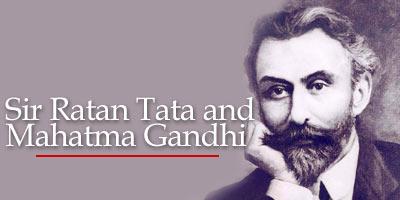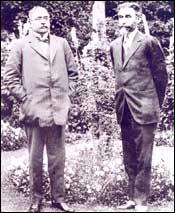 | « Back to article | Print this article |

'In all humility I may say that I have come here also as a friend of the capitalists -- a friend of the Tatas. And here it would be ungrateful on my part, if I do not give you a little anecdote about how my connection with the Tatas began. In South Africa when I was struggling along with the Indians in the attempt to retain our self-respect and to vindicate our status it was Sir Ratan Tata who first came forward with assistance.' -- Extract from Mahatma Gandhi's speech delivered at Jamshedpur on August 8, 1925.
Mahatma Gandhi, born in Porbandar, Gujarat, known as Father of the Nation, in truth, belonged to the world. His struggle for Indian independence raised human values to new heights. Merely with two weapons, 'Satya' (truth) and 'Ahimsa' (non-violence), he showed the world that wars can be fought and won.
Around the same time, Jamsetji Nusserwanji Tata, born in Navsari, also in Gujarat, a great Indian patriot and the founder of the House of Tatas, battled too for India's freedom, of somewhat another genre, sowing the earliest seeds of Industry in the country and economic self-reliance.
His second son, Sir Ratan Tata, inheriting his father's great sense of generosity for the good of the country, had extremely meaningful interaction with Gandhi in the great chapter of India's road to freedom.
It is this interaction that I wish to recall as a tribute from the House of Tatas to Mahatma Gandhi.
In 1893, Mohandas Karamchand Gandhi, (1869-1948), popularly known as Mahatma, proceeded to South Africa as legal counsel to an Indian firm. He stayed there for over two decades - the formative period of a great life -- and led the immigrant Indian community against the tyranny of the 'White Government.'
Gandhi founded the Natal Indian Congress, edited the newspaper Indian Opinion and experimented with his unique non -- violent Satyagraha in 1906 and 1908 to resist the curtailment of rights of Asiatic settlers in South Africa.
Imprisoned and subjected to brutal treatment, he led in 1913 the great march of the Indian community across the Transvaal border from Newcastle in Natal province against the official policy of gross racial discrimination.
During this movement Sir Ratan Tata came into contact with Mahatma Gandhi and helped him carry on with the struggle in South Africa.
The Mahatma and Sir Ratan
Sir Ratan Tata, (1871-1918) was Knighted in 1916. Amongst other humane qualities, Sir Ratan extended the financial support to Gopal Krishna Gokhale (1866-1915 -- Indian statesman, whom Gandhi regarded as his political guru) to set up the Servants of India Society.
In 1912 he encouraged the University of London to institute a chair at the London School of Economics to investigate and research into the causes of destitution and poverty in India.
He funded the first archaeological excavation at Patliputra between 1913-1917, which resulted in the discovery of the hundred-column Mauryan throne room in Ashoka's Palace.
He had a discerning eye for art too, and had a great art collection, but with his sense of generously bequeathed it all to the Prince of Wales Museum, Mumbai.
After his death his wife Lady Navajbai endowed a house at Shantiniketan for European research scholars coming to India to study Oriental literature and culture.
In this article I will concentrate on the assistance and support that Gandhi received from Sir Ratan for his non-cooperation movement in South Africa.
 The beginning was in November 1909 when Gandhi received a cheque for Rs 25,000 from Sir Ratan to assist him in his non-cooperation movement in the fight for the rights of the Indians in South Africa. In a cable to Gopal Krishna Gokhale, Gandhi informs: "Pray thank Mr Tata for munificent timely help. Distress great. Prisoners' lot hard. Religious scruples disregarded. Rations short. Prisoners carry slop-pails; for refusing, put on spare diet. Solitary confinement. Prominent Moslems, Hindus, Parsis in jail."
The beginning was in November 1909 when Gandhi received a cheque for Rs 25,000 from Sir Ratan to assist him in his non-cooperation movement in the fight for the rights of the Indians in South Africa. In a cable to Gopal Krishna Gokhale, Gandhi informs: "Pray thank Mr Tata for munificent timely help. Distress great. Prisoners' lot hard. Religious scruples disregarded. Rations short. Prisoners carry slop-pails; for refusing, put on spare diet. Solitary confinement. Prominent Moslems, Hindus, Parsis in jail."
On December 5, 1909 at the Johannesburg Mass meeting, a resolution was passed stating: "This meeting of British Indians of the Transvaal places on record its thanks to Ratan Jamsetji Tata, Esq. for his munificent and timely donation of Rs 25,000 in aid of the struggle."
In the Indian Opinion, dated December 11, 1909, Gandhiji wrote: "That India has been roused is evident from the generous gifts of Mr Ratanji Jamsetji Tata. By his big donation of Rs. 25,000 he has given a powerful impetus to our movement. He will probably be followed by other Indians."
"Parsis are known the world over for their generous gifts. Mr Tata has been true to that spirit of generosity. We have had many generous donations from him. For us, therefore, Mr Tata's gift is no matter for surprise," Gandhiji wrote.
"Mr Tata has laid the entire community under obligation, what is the way to repay it ? Our courage must increase ten fold after what has happened. The money has been given in the faith that we shall carry on the struggle to the bitter end. It is up to us to prove that we are worthy of such confidence."
"If Mr Tata's gift is a matter for satisfaction, it also calls for a warning. In this world a gift can rarely be turned to good account. Only a few know how to put to good use money got as a gift. Such money makes people weak -- willed and selfish. Our fight is on self-help and is intended to bring about our own regeneration. Therefore, should Mr. Tata's gift lead people to relax their efforts. It may do more harm than good. We would urge the Indian Community not to slacken in its duty in South Africa, regardless of this gift."
Sir Ratan does it again
On January 10, 1910, Sir Ratan wrote to Gandhi from Bombay: "My warm appreciation of the noble struggle our countrymen are waging and I am gratified to find that the beginning thus made by me (Rs 25,000 in donation ) has been followed up. I need hardly add that I shall watch the progress of the struggle with great interest and sincerely hope that these brave efforts for the vindication and upholding of the country's honour and dignity will soon be crowned with the success they deserve."
In the same letter Sir Ratan Tata sent forth a further donation of Rs 25,000 to Gandhi.
In the Indian Opinion, dated December 17, 1910, under the heading Tata and Satyagrahis, Gandhi wrote: "By donating another sum of Rs 25,000 for the Satyagraha Campaign, Mr Ratan Tata has demonstrated that he has utmost sympathy for us and that he fully appreciates its value. Including his earlier donations, a total of Rs 125,000 has been offered in India."
"His letter is as inspiring as his gift is generous. Mr Tata knows very well that this is not a struggle to secure our own narrow ends, but that it is for the honour of India. He has said, in so many words, that the effects of this struggle will be felt in all parts of the world under British rule, and that is exactly what will happen."
"Even a man like General Smuts has stopped talking of racial discrimination. His two Acts show that in law at least all citizens must have the same status. Fortunate, indeed are those Indians who are taking part in a campaign of such remarkable power."
"His letter and the help he has given have doubled the burden of our responsibility. Satyagrahis ought to remain staunch; even those who cannot afford to go so far (as to offer satyagraha) ought to give, as a matter of duty, whatever they can."
A public letter to Sir Ratan Tata
On April 1, 1912, Gandhi addressed a public letter to Sir Ratan in which he said: "I am ashamed to have to own that I am only now able to fulfill the promise I made, to you and to myself, in my letter acknowledging your second generous contribution of Rs 25,000 towards the expenses of the great Resistance struggle, that I should write a public letter to you, in which I intended to incorporate an account of receipts and expenditure."
Sir Ratan Tata's third donation
In the 'Indian Opinion' of August 10, 1912, Gandhi wrote the following article under the heading, 'Mr Tata's Munificence': "Mr Ratan Tata has outdone himself. At the Sheriff's meeting held at Bombay on the August 31, 1912, it was announced that Mr Tata had given a third contribution of Rs 25,000 to the Transvaal passive resistance fund. The total given by Mr Tata, therefore, amounts to £5,000 -- a fortune in itself."
"He has made the lot of passive resisters easy; and the fact that there are at the back of the struggle such distinguished Indians, encourages those who are engaged in it, and probably brings them nearer their goal. The moral effect of such help on those who, from prejudice, are opposed to us, is also obvious."
Gandhi also later wrote: "The paper, Indian Opinion, has never been in a position to pay its way. The paper would have been in dire straits if Mr Tata's generous help had not been drawn upon to meet its needs."
It is such coming together of great men that not only has made India ever rich and constant, but has made every man of the land proud of the golden pages of his country's history.
The author heads the Tata Central Archives, Pune. He earlier had set up Tata Steel Archives, Jamshedpur, and prior to that was with the National Archives of India, New Delhi.
Courtesy: Tata Central Archives
Photographs: Tata Central Archives